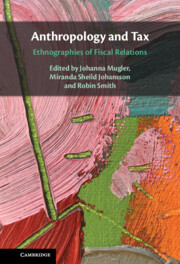Refine search
Actions for selected content:
62 results
Chapter 7 - The Economy in the Feyerabend Lecture Notes on Natural Right
-
-
- Book:
- Kant's Lectures on Political Philosophy
- Published online:
- 18 July 2025
- Print publication:
- 07 August 2025, pp 122-141
-
- Chapter
- Export citation
25 - Innovation Policy and the Press
- from Part VI - Supporting the Press Function
-
-
- Book:
- The Future of Press Freedom
- Published online:
- 25 July 2025
- Print publication:
- 24 July 2025, pp 437-465
-
- Chapter
-
- You have access
- Open access
- HTML
- Export citation
Defining the goal of a data tax
-
- Journal:
- European Law Open / Volume 3 / Issue 4 / December 2024
- Published online by Cambridge University Press:
- 19 March 2025, pp. 902-909
-
- Article
-
- You have access
- Open access
- HTML
- Export citation
The impact of taxes and wasteful government spending on giving
-
- Journal:
- Experimental Economics / Volume 24 / Issue 2 / June 2021
- Published online by Cambridge University Press:
- 14 March 2025, pp. 355-386
-
- Article
- Export citation
Tax compliance and obedience to authority at home and in the lab: A new experimental approach
-
- Journal:
- Experimental Economics / Volume 9 / Issue 4 / December 2006
- Published online by Cambridge University Press:
- 14 March 2025, pp. 343-359
-
- Article
- Export citation
13 - The Parable of the Pounds (Lk 19:1–27)
-
- Book:
- Luke's Unique Parables
- Published online:
- 28 February 2025
- Print publication:
- 06 March 2025, pp 155-172
-
- Chapter
- Export citation
The state-capital nexus in fragile contexts: a case study of tax relations in Somalia
-
- Journal:
- The Journal of Modern African Studies / Volume 63 / Issue 1 / March 2025
- Published online by Cambridge University Press:
- 26 August 2025, pp. 25-50
- Print publication:
- March 2025
-
- Article
-
- You have access
- Open access
- HTML
- Export citation
Acceptability patterns of hypothetic taxes on different types of foods in France
-
- Journal:
- Public Health Nutrition / Volume 28 / Issue 1 / 2025
- Published online by Cambridge University Press:
- 26 December 2024, e18
-
- Article
-
- You have access
- Open access
- HTML
- Export citation
3 - An Ecology of Payments: Taxes, Cuotas, and Fees in Highland Bolivia
-
-
- Book:
- Anthropology and Tax
- Published online:
- 12 December 2024
- Print publication:
- 19 December 2024, pp 95-112
-
- Chapter
-
- You have access
- Open access
- HTML
- Export citation
Foreword
-
-
- Book:
- Anthropology and Tax
- Published online:
- 12 December 2024
- Print publication:
- 19 December 2024, pp xi-xiv
-
- Chapter
-
- You have access
- Open access
- HTML
- Export citation
4 - The Persistence of Kindred Spirits: Tax and Values in Istrian Distilling
-
-
- Book:
- Anthropology and Tax
- Published online:
- 12 December 2024
- Print publication:
- 19 December 2024, pp 113-135
-
- Chapter
-
- You have access
- Open access
- HTML
- Export citation
8 - General Knowledge and Particular Society: Taxation as a Way of Knowing
-
-
- Book:
- Anthropology and Tax
- Published online:
- 12 December 2024
- Print publication:
- 19 December 2024, pp 200-221
-
- Chapter
-
- You have access
- Open access
- HTML
- Export citation
9 - The Colonial Debris in the Digitalisation of Tax in Kenya
-
-
- Book:
- Anthropology and Tax
- Published online:
- 12 December 2024
- Print publication:
- 19 December 2024, pp 222-238
-
- Chapter
-
- You have access
- Open access
- HTML
- Export citation
Advancing an Anthropology of Tax
-
-
- Book:
- Anthropology and Tax
- Published online:
- 12 December 2024
- Print publication:
- 19 December 2024, pp 1-48
-
- Chapter
-
- You have access
- Open access
- HTML
- Export citation
1 - Becoming the Good Migrant: How Romanian Migrants Mobilise Taxpayer Status
-
-
- Book:
- Anthropology and Tax
- Published online:
- 12 December 2024
- Print publication:
- 19 December 2024, pp 49-72
-
- Chapter
-
- You have access
- Open access
- HTML
- Export citation
14 - Sharing beyond the State: International Tax Norm Negotiations at the OECD
-
-
- Book:
- Anthropology and Tax
- Published online:
- 12 December 2024
- Print publication:
- 19 December 2024, pp 326-352
-
- Chapter
-
- You have access
- Open access
- HTML
- Export citation

Anthropology and Tax
- Ethnographies of Fiscal Relations
-
- Published online:
- 12 December 2024
- Print publication:
- 19 December 2024
-
- Book
-
- You have access
- Open access
- Export citation
8 - Taxation power
- from Part 2 - Legislative powers
-
- Book:
- Australian Constitutional Law
- Published online:
- 14 December 2023
- Print publication:
- 04 January 2024, pp 201-234
-
- Chapter
- Export citation
12 - Unshackled States, Shallow Economic Governance
- from Part IV - Economic Hindrances
-
- Book:
- Freedoms Delayed
- Published online:
- 20 July 2023
- Print publication:
- 20 July 2023, pp 213-231
-
- Chapter
- Export citation
3 - The Long Shadow of Tributum in the Long Fourth Century
- from Part I - Historical Sources
-
-
- Book:
- Making the Middle Republic
- Published online:
- 20 April 2023
- Print publication:
- 27 April 2023, pp 38-63
-
- Chapter
- Export citation
